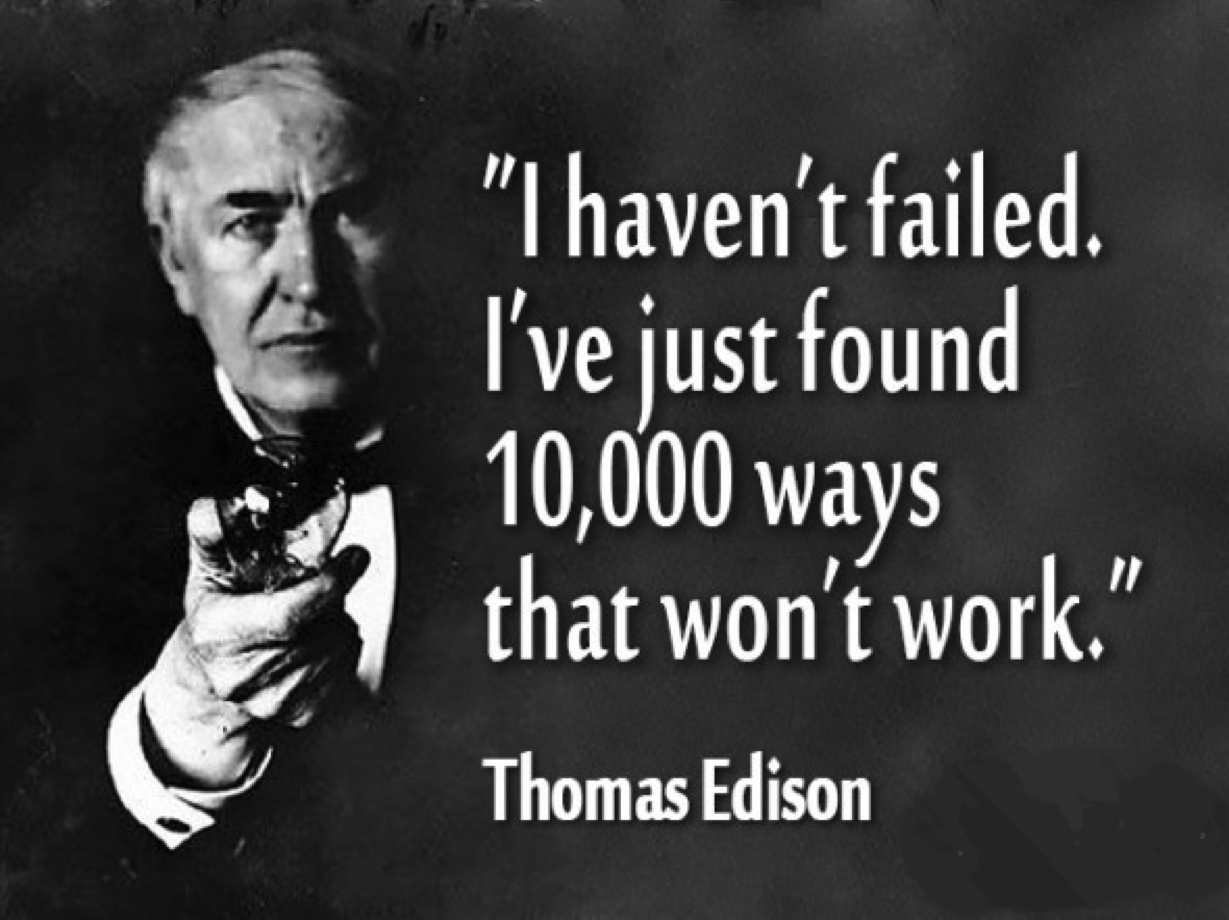Problem Solving - A Plan for Failure
Friday, October 11, 2013
Solving a really difficult problem can be an exhilarating experience. The sense of accomplishment can be profound but there are usually a few failed attempts on the road to total glorious victory.

In many ways, problem solving is a plan for failure. This concept may seem counterintuitive at first, so let me elaborate. By definition, a really difficult problem is not going to be easy to solve. Your first few attempts will most likely fail. So, your ultimate success may depend on how fast you can learn from your failures.
I encourage you to plan for failure. Don't be surprised. Don't get discouraged. It's just a normal part of the problem solving process. You should view these failures as golden opportunities that may provide you with the help you need to find a successful solution.
Common Reasons for Failure
The bullet points below are a few of the common reasons why people fail to solve their problems. I've added some of my own commentary beneath each one of them.
• You lack information.
You need to add more or better information.
You'll probably never have 100% of the information you desire. So the issue becomes, what information is necessary to solve your problem. At a bare minimum, you need to have a clear understanding of your situation. You can do this by identifying the best sources of information for your issue and develop that information by using our structured problem solving techniques.
• You have too much information.
You need to improve your ability to interpret your data.

Information overload has become more prevalent as our society races forward with technology. There are a couple of ways this can be troublesome in problem solving. First, there's paralysis by analysis. This is where you find your analytical processing abilities simply overwhelmed by a tsunami of data. This is not good but it's usually pretty obvious when it's happening. Then there's another far more subtle aspect of 'big data' you should be aware of. Psychological experiments have been conducted on the relationships between the amount of information available to experts, the accuracy of judgments based on this information, and the expert's confidence level in the accuracy of these judgments. Unfortunately, these experiments have shown us that our confidence level tends to go up with more data but our accuracy tends to go down.
• You have some bad information.
You need to validate your data.
Sometimes your information is good. Sometimes your information is not so good. The important thing, is to understand the quality of your information. You may need a method to check your information to determine it's quality, especially your mission critical data. Validating your data may have some subtleties, too. There's a lot of disinformation out there, so always try to validate your critical data or at the very least try to verify the degree of uncertainty you're dealing with.
• Your regular methods aren't working on this particular problem.
Try using different methods.
There are many common ways people go about solving their problems. However, when your regular methods don't work you can get stuck. If you're stuck, we suggest you try using some new methods. We offer over 100 free problem solving tools, techniques, and methods in our Toolkit. These are the best ones we could find in books and on the internet.
• You're not familiar with the methods needed to solve your problem.
Try learning new methods.
Our tools are written in a simple step-by-step style that make them easy to use. First, take a look at what tools we've made available to you. Second, determine which ones you think can help you the most. Finally, just roll up your sleeves and get to work. You may also want to check out our Solvers (all-in-one problem solving methods).
• You don't have enough time.
You may need to manage your time more efficiently or determine if your time constraints are real or arbitrary.

Sometimes you just don't have enough time, period. For example, your boss tells you to spare no expense but you must have a cure for the common cold by the end of the day. It ain't happening ... and there's nothing you can do about it. There's a physical time constraint that makes this impossible. Now, let's say your boss gives you an unlimited budget and 50 years to find a cure for the common cold. See how important changing the time element can be? I think time is one of the most important aspects in problem solving. It's so obvious, we sometimes tend to overlook it. With unlimited amounts of time almost anything seems possible. When time is short your options may be very limited.
• You're unable to properly identify the root cause of your problem.
Use our root cause analysis tools.
Failing to identify the root cause of a problem is a common reason for not being able to solve it. You need to make sure you're solving the real problem. Not the symptoms of your problem. Not the problem someone else thinks you have. Not the problem you already have a solution for. If you don't know the root cause of your problem, you may be solving the wrong problem. Folks, I learned this one the hard way. Don't make the same mistake I did.
• You're seeking a perfect solution.
You need to change your expectations.
Expectations can play a huge role in problem solving. Your preconceptions can make you or break you when it comes to problem solving. One of the four cornerstones in our problem solving model is predispositions. Searching for a perfect solution implies that you already have a preconceived notion that a perfect answer exists. You'd be much better off to start with an open mind, use our structured problem solving approach, and see what you can learn about finding the best solution.
• You're relying on outmoded mental models.
Surface, examine, and improve the unquestioned mental models at the heart of your problem.

Unquestioned mental models can certainly lead to problems given the rapidly changing, highly complex, and uncertain world we live in. If you understand that all of your analysis is based on your potentially fallible mental models, then you need an approach that gives you the greatest amount of mental agility and flexibility. Ultimately, it stands to reason that your success or failure to solve your problem may rest with your ability and willingness to question your own thinking.
• You're subject to a psychological pitfall.
Use structured problem solving techniques to overcome pitfalls.
There are many psychological pitfalls that can keep you from solving your problems. There are way too many of them to discuss in this blog post. Take a quick look at these Wikipedia lists of common pitfalls: cognitive bias, fallacies, cognitive distortions, memory bias, etc. See what you're up against? There are literally hundreds of ways your thinking can be derailed by psychological pitfalls. If you're interested in this subject, check out Richards J. Heuer's authoritative book titled: Psychology of Intelligence Analysis. It's a fabulous book. It will forever change the way you look at the world.
I ♥ Failure

Most of us have been socialized to think that failing at anything sucks. It's something you should avoid. You don't want to be tainted by failure; it's a label that might stick to you.
Not many of us wake up in the morning thinking, "Today is going to be a great day to fail!". However, you may be surprised to learn that people who have this mindset are quite successful. These people are fearless when it comes to failure. They view it as an opportunity for growth. Failure is just a bump, on the road to success.
Failure is always going to be a part of solving really difficult problems. You'd be wise have your own philosophy for dealing with failure, before you encounter it further up the road.
by Keith Glein, Founder & CEO
